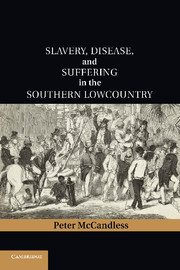Book contents
- Frontmatter
- Contents
- List of Figures
- List of Maps
- Preface
- Acknowledgments
- List of Abbreviations Used in Notes
- MAP 1 The Lowcountry, Charleston, and the Caribbean region
- MAP 2 The South Carolina lowcountry, showing Anglican parishes and slave proportion of population, c. 1760s
- MAP 3 Charleston Harbor, based on a British map, c. 1780
- MAP 4 The Revolutionary War in the South
- PART I TALK ABOUT SUFFERING
- PART II COMBATING PESTILENCE
- 8 “I Wish That I Had Studied Physick”
- 9 “I Know Nothing of this Disease”
- 10 Providence, Prudence, and Patience
- 11 Buying the Smallpox
- 12 Commerce, Contagion, and Cleanliness
- 13 A Migratory Species
- 14 Melancholy
- Bibliography
- Index
- References
9 - “I Know Nothing of this Disease”
Published online by Cambridge University Press: 03 May 2011
- Frontmatter
- Contents
- List of Figures
- List of Maps
- Preface
- Acknowledgments
- List of Abbreviations Used in Notes
- MAP 1 The Lowcountry, Charleston, and the Caribbean region
- MAP 2 The South Carolina lowcountry, showing Anglican parishes and slave proportion of population, c. 1760s
- MAP 3 Charleston Harbor, based on a British map, c. 1780
- MAP 4 The Revolutionary War in the South
- PART I TALK ABOUT SUFFERING
- PART II COMBATING PESTILENCE
- 8 “I Wish That I Had Studied Physick”
- 9 “I Know Nothing of this Disease”
- 10 Providence, Prudence, and Patience
- 11 Buying the Smallpox
- 12 Commerce, Contagion, and Cleanliness
- 13 A Migratory Species
- 14 Melancholy
- Bibliography
- Index
- References
Summary
I have been greatly afflicted with nephritick pains and a stoppage of urine … and there is little help to be had from any of the doctors of this place in so critical a disease, the best of them having originally been no more than barbers.
Gideon Johnston, 1710[A] blessed state of health which the inhabitants of this town have enjoyed for some years past and which I hope will continue until all the doctors in the place die of old age.
Henry Laurens, 1770Mr. Deas has got rid of his fever, but poor William's will not yet take leave of him. I have just been administering a dose of James's Powders, and I hope by the aid of arsenic to cure him in a day or two.
Anne Deas, 1814DOCTORS DIFFER
In the decades leading up to the Civil War, some doctors in the slave states advocated a distinctive southern medicine, or what they sometimes called “states-rights medicine.” They urged the creation of medical schools staffed by southern doctors, where students could learn to treat the distinctive diseases of the region and the “peculiarities” of black bodies and diseases. “Southern medicine” was more rhetorical than real, a reaction to the increase of sectional tension in the United States that produced secession. The healing arts as practiced in the southern states never differed hugely in practice from those in other parts of America or in the western world generally.
- Type
- Chapter
- Information
- Slavery, Disease, and Suffering in the Southern Lowcountry , pp. 168 - 187Publisher: Cambridge University PressPrint publication year: 2011



